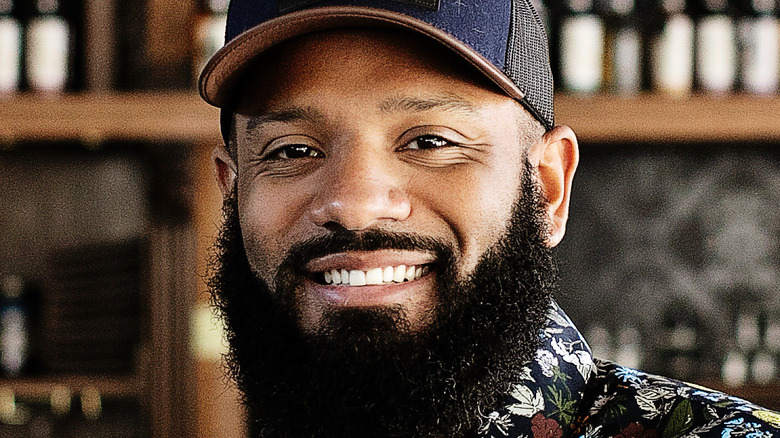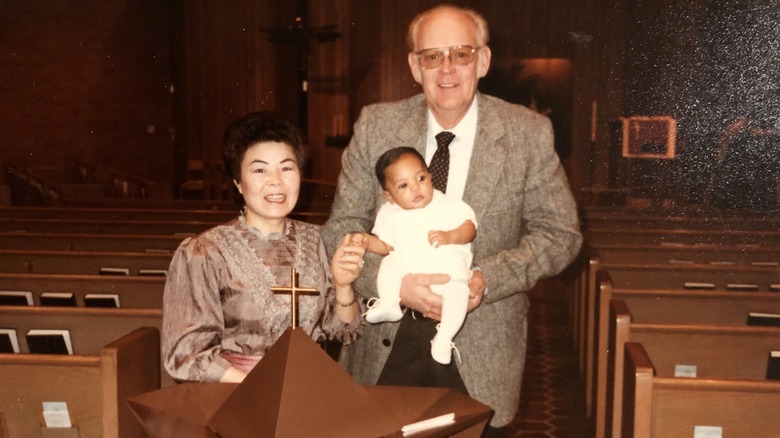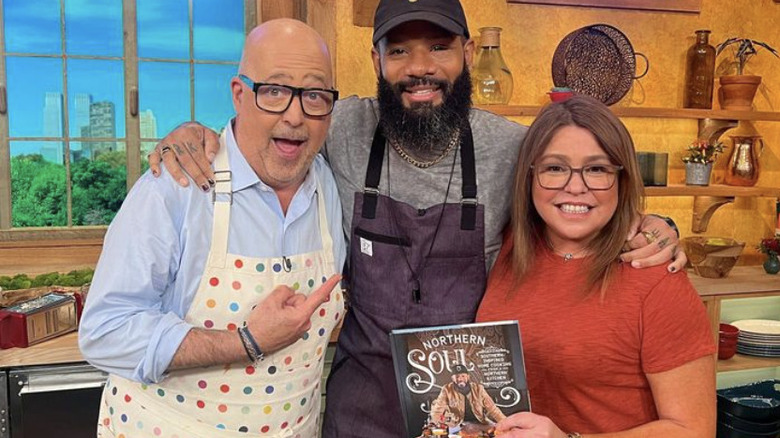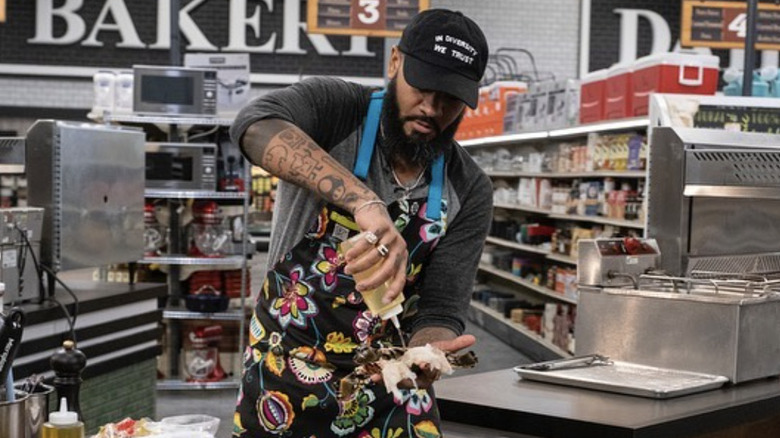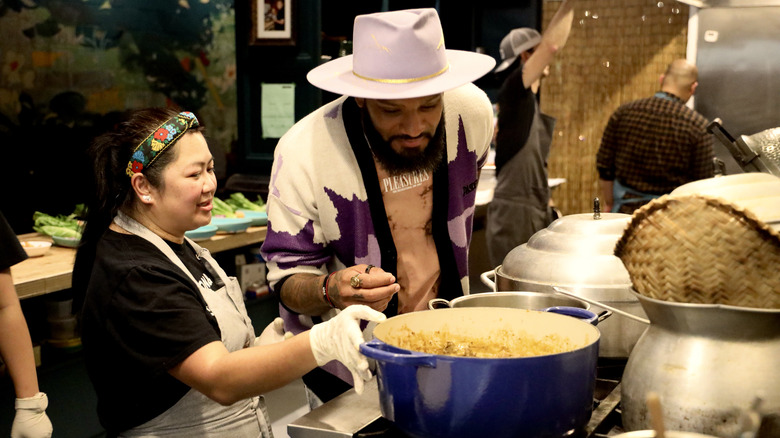Justin Sutherland Blends Food And Culture In His New Cookbook - Exclusive Interview
We may receive a commission on purchases made from links.
Justin Sutherland remembers growing up in the kitchen cooking with his grandmothers and being so enamored by it that one of the first things he asked for was an Easy Bake Oven at just 5 years old. That early passion would later spur him to cook professionally and ultimately land him on the national stage showcasing his skills on Season 16 of "Top Chef" and winning "Iron Chef America."
Not one to rest on success, Sutherland then opened his first restaurant, Handsome Hog, in his home state of Minnesota, which features food from his Southern roots like smoked beef brisket and bourbon aged ribeye. The "Fast Foodies" star also operates several other eateries, including Chickpea Hummus Bar and The Gnome. Despite everything that's on his plate — literally and figuratively — the chef somehow also found time to write a critically acclaimed cookbook called "Northern Soul" that's being praised by culinary icons like Rachael Ray and Andrew Zimmern.
We spoke to Sutherland in an exclusive interview about what it was like growing up with Southern and Japanese roots, which recipes in his new cookbook have significant meaning for him, and what fans can expect to see on the new season of "Taste the Culture."
How growing up in the Midwest impacted his culinary approach
How would you say growing up in Minnesota influenced your cooking style?
Minnesota has such an unknown, diverse food community here. We have the largest Somali population, largest Hmong population, huge Vietnamese population, plus very Scandinavian roots. I got exposed to a lot of food growing up.
In your new book, "Northern Soul," you write that your first word was "bread" and that you wanted an Easy Bake Oven as a kid. Where do you think that passion came from at such a young age?
I was always following my grandmothers around the kitchen. They were always cooking. I had a grandma from Japan and a grandma with Southern roots, and food was their love language. I was always the kid watching them cook, tasting everything, banging on pots and pans as drums. For some reason, I was drawn to the kitchen and loved following those women around.
How did growing up with your grandma being from Japan and your grandfather being from Mississippi shape the way you look at food and culture?
Food was culture. My Japanese grandmother came to this country speaking no English, so food was the way that she was able to share her culture with us. At 5 years old, [I was] eating sushi and sukiyaki, katsu, and all those things that other 5-year-olds weren't eating. The Southern roots on my dad's side — they didn't grow up with a lot of money, but there was that soul food that they were always feeding everybody. That was one thing that they could always do — share food.
What it feels like to get high praise from Rachael Ray on his new cookbook
Rachael Ray said she was covered in chills after reading your cookbook and that "it's mindful, soulful, important, and truly American." What did it feel like to get a review like that from her?
It's crazy. To spend two and a half years of your life writing this book, and you're taking stories that are deeply personal and sharing them with the world ... For somebody of that level, especially somebody you look up to in culinary — to have [them] be affected by your book meant a lot.
You have so many incredible-sounding recipes in your book, from Creole Jambalaya to a Bourbon Pecan Pie with Maple Whip. Is there any recipe that has a special meaning for you?
It's probably one of the most simple recipes in the book, but one of the most meaningful in the story of soul food in general, and of my grandmother, would be the collard greens. [It] tells that story of soul food, of food that started as foods of enslaved people and taking these humble ingredients and turning them into something delicious. Collard greens definitely tells the story of the book.
How being on food competition shows has changed his life
How would you say your life has changed since being on hit shows like "Iron Chef America" and "Top Chef"?
Drastically. It was nothing I ever planned for or even thought about ever happening. When I first got the call for "Iron Chef," I thought I was getting a prank phone call. I actually hung up on the producer because I thought it was one of my friends punking me, and they called back. They're like, "No, we're serious." That first "Iron Chef" win sent me into "Top Chef." After that, [my] world really changed and still involved food, but very much in food entertainment and television now. It was life-changing.
As a co-host on "Fast Foodies," what's been the most difficult thing for you to recreate that a celebrity guest asked for?
As far as recreating the actual dish, all of them — even the simplest thing, from the cheeseburgers and chicken nuggets. You realize how much science and research goes into these meals, that the cheeseburger at McDonald's tastes the same no matter where you go around the world, and [you're] trying to dial in that recipe on anything. That was probably the hardest part. Remixing was easier because we could do our own thing, but trying to replicate that flavor of Taco Bell beef or the spicy chicken sandwiches, they're all pretty hard.
Which one do you think turned out the best that was the closest to what you were trying to go for?
The Wendy's Spicy Chicken Sandwich was a home run. What else did I win? Portillo's hotdog, I did pretty good on.
His favorite fast food and what viewers can expect on the new season of Taste the Culture
Having worked with so many incredible chefs over the years, who's the one chef you'd want to cook you dinner?
Oh, man. I'd love a dinner from [Masaharu] Morimoto, with the love of Japanese food. He is a wizard. I'd love to have a meal cooked by him.
What is the one ingredient you can't live without?
Butter.
What is your go-to fast food order and at which restaurant?
It's a combination of two restaurants. My two favorites are Arby's within KFC, but I like to get a Beef and Cheddar from Arby's, and then I like to go to KFC and get the gravy and put the Beef and Cheddar in the gravy from KFC.
That sounds amazing. The gravy is so good at KFC.
So good.
I don't know what they put in it, but it's delicious. I tried to recreate their gravy during the pandemic, and it turned out so bad.
I know. It's a tough one to nail. It's either too much flour, or it's lumpy. KFC, whatever they do with that gravy, I still can't figure it out.
Do you have any other projects you'd like to talk about?
My new show, "Taste the Culture" — Season 2 of that just came out on the Turner Network, True TV, and HBO Max.
What can fans expect to see in this new season of "Taste the Culture"?
This season is set in New York, and we expanded the food world. We went and visited the first Black-owned speakeasy. We went to this underground THC dinner experience. That was amazing. We went to Harlem and hung out with Adrienne Cheatham, who was an amazing chef from working at Michelin Star restaurants. Now she's off doing her own thing. New York was a great place to go and learn cool stories in the food space.
Justin Sutherland's cookbook, "Northern Soul," is available on Amazon.
This interview has been edited for clarity.
